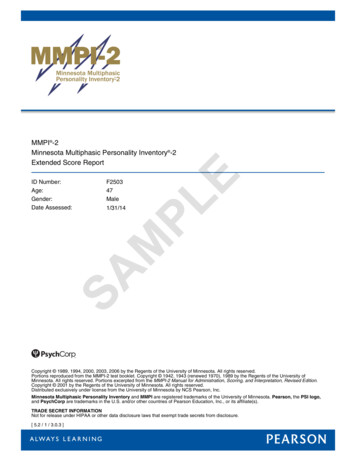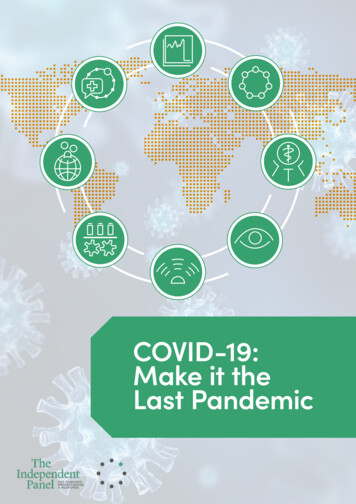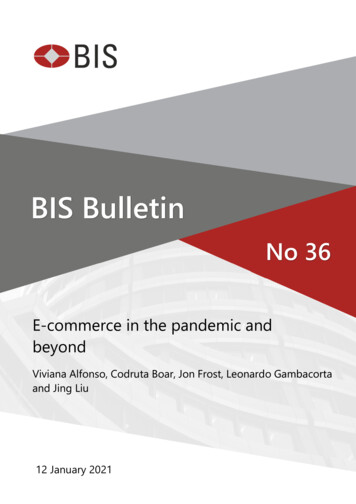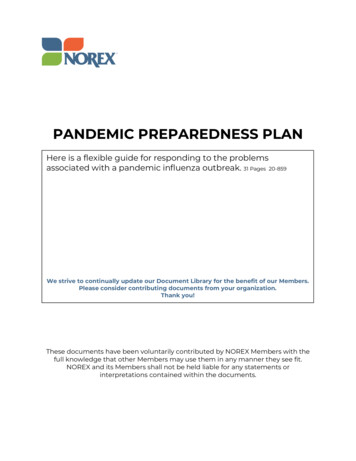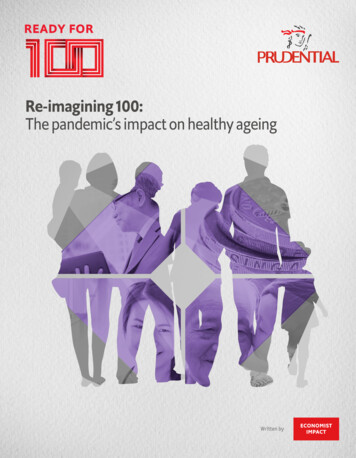
Transcription
Re-imagining 100:The pandemic’s impact on healthy ageingWritten by
While most Singaporeanssay their physical health hasremained stable or improvedsince the onset of covid-19,more than a third saytheir mental health hasdeteriorated in this time.
Contents Economist Impact 2021Introduction1A pandemic stress test2Relationship strain5Balancing work and personal6Opportunities for andemic’sThe pandemic’sfor 100?impactHealthyimpacton healthyoncarehealthyinageingSingaporeageing 3
IntroductionIn the past decade, living to the age of 100has become a realistic prospect for manySingaporeans. Not only has the quality ofhealthcare in the country improved, but so hascitizens’ awareness of disease risk factors andhow their lifestyle choices can reduce or increaserisk. In 2021 Singapore still boasts one of theworld’s longest average life spans (83.9 years).1The protracted covid-19 crisis might beexpected to dent Singaporeans’ prospects ofliving into their 90s and beyond, or at leasttheir hopes of doing so. An Economist Impactsurvey completed in June 2021, however,indicates that this is not the case. In fact, ahigher percentage of people surveyed (31%)today feel prepared to live to 100 from aAbout the researchThis report analyses the health-related findings of a survey of 1,218 residents ofSingapore conducted in May-June 2021. The survey explores how the pandemic hasimpacted Singaporeans’ prospects of living to 100 in terms of their personal healthand well-being and their financial situation. The respondents fall into five age cohorts:25-34, 35-44, 45-54, 55-64 and 65-74. The sample is split evenly between males andfemales and almost evenly split between people earning less than S 50,000 annually(49%) and those earning more than that (51%). For more details on the wider surveyand the sample demographics, see Re-imagining 100: The pandemic’s impact on longevity.health and wellness perspective than wasthe case in a similar survey conducted in2018 (23%).2 A combination of factors islikely behind this optimism, including whatappears to be people’s sustained attention tomaintaining or improving exercise levels anddietary practices, and possibly the country’ssuccess at keeping coronavirus infection andfatality rates relatively low.Respondent perceptions of their physicalhealth outlook have largely remained stableduring the pandemic. The same is broadly trueof mental health, but the share reporting adeterioration is higher than is the case withphysical health. A challenge for public healthauthorities, as for Singaporeans themselves,is to reduce the chances that the mentaland emotional toll of the pandemic leads tophysical health problems later in life.1 2020 data from Singapore Department of Statistics.2 See Ready for 100: Preparing for longevity in Singapore for the 2018 survey results.1 Re-imagining 100: The pandemic’s impact on healthy ageing Economist Impact 2021
A pandemic stress testOne explanation for Singaporeans’ improvedview of their physical health, accordingto Dr Janil Puthucheary, Singapore’ssenior minister of state for health, andcommunications and information, isthe country’s success in containingthe coronavirus outbreak. “We’ve beenfortunate,” he says. “Health outcomes havebeen good with a low fatality rate. There’s noreason that a person who hasn’t contractedcovid-19 should consider it a factor in theirpotential life expectancy.”Daniel Fung, chief executive officer of theInstitute of Mental Health, also notes thatpeople have sought to maintain a physicalexercise regimen during the lockdowns. Thisis supported by the survey results, which showthat respondents’ physical exercise patternsremain largely unchanged from 2018. In 2021,55% report taking 20 minutes or longer ofexercise several times a week, compared with57% in the earlier survey. Today, 38% saytheir level of physical exercise has remainedunchanged during the pandemic while 31%say it has improved. The analogous figures fortheir diet are 53% and 27%.a deterioration in their physical health—28%compared with 25% in the overall sample, and18% in the 55-64 age group.Overall, a large majority of Singaporeans saytheir physical health has remained stable(52%) or improved (22%) since the onset ofcovid-19. There is some variation across agegroups: respondents between 35 and 54 aremore likely than those of other ages to reportIncreased mental health issues in thepopulation are expected, according to DrPuthucheary. “They are a result of people’ssocial isolation, their loss of contact withfamily and friends, the economic fallout, andtheir anxiety over livelihoods,” he says. “TheseAs Figure 1 shows, the picture is somewhatdarker when it comes to mental health: 35%overall, and as high as 41% among 25-34year-olds, say it has deteriorated. This is likelylinked to the 42% who report increased stressand anxiety levels as a result of the pandemic.Figure 1: The pandemic’s impact on personal healthHow have the following changed as a result of %14%Physical healthWorsenedNo changeMental healthDietPhysical activityStress/anxiety levelsImprovedSource: Economist Impact Economist Impact 2021Re-imagining 100: The pandemic’s impact on healthy ageing 2
Figure 2: A heavier mental health strain on younger Singaporeans% of respondents reporting that their mental health has deteriorated as a result of 65-7425%Source: Economist Impactare all known stress factors for mental healthand have all intensified during the crisis.”Dr Fung attributes the greater problemsexperienced by younger people partly to thereduced opportunity for social interactions,which are very important at younger ages.“Young people are struggling in our practice,”he says. Eighteen months since covid-19’sonset, says Dr Fung, “there remain a lot morepeople seeking our help than had previouslybeen the case. The effects are still being felt.”Stress levels are likely to subside providedthe effects of covid-19 remain contained,but mental health problems are likely tolinger. These could have knock-on effects onpeople’s physical well-being, says AngeliqueChan, executive director of the Centre forAgeing Research & Education at the Duke-NUSMedical school. “Mental and physical healthare very much interrelated,” she says, “andthe former can affect eating behaviours andphysical activity levels.”To their credit, public health authorities haverecognised the strains the pandemic hasplaced on people’s emotional and mentalhealth and taken actions to address it.For example, the Health Promotion Board(a statutory board under the Ministryof Health) has introduced initiativesduring the crisis to help citizensrecognise and deal with these strains.One example, the “Brave the New” campaign—which ran from August 2020 to March 2021and was launched together with the Ministryof Culture, Community and Youth—soughtto reassure the public that it was normal tofeel stressed or anxious during a pandemicand provided them with tips on coping.Another example, Hi! #JustCheckingIn, aninitiative conducted in January-March 2021,encouraged people to check-in on their lovedones and provided advice on how to conductsupportive conversations.33 Information on these and other government programmes was provided to Economist Impact by the Health Promotion Board.3 Re-imagining 100: The pandemic’s impact on healthy ageing Economist Impact 2021
Stress levels are likely to subsideprovided the effects of covid-19remain contained, but mentalhealth problems are likely to linger Economist Impact 2021Re-imagining 100: The pandemic’s impact on healthy ageing 4
Relationship strainPressure on personal relationships is alsolikely a factor in heightened mental healthproblems, as relationships are critical tohelping people cope. Although 62% of surveyrespondents say they are happy today intheir most important relationship, this is aconsiderable drop from the 92% who statedthis in 2018.The causal factors for some people may belong periods living with families in tightquarters and for others isolation. Forexample, Ms Chan says that her team has seenconsiderable distress from many seniors as aresult of isolation. “This has especially beenthe case during lockdown when relatives wereunable to visit them, and far from all coulduse online platforms to connect.Figure 3: The pandemic’s impact on relationships% of respondents agreeing that they are happy in their most important 861%25-3435-4463%58%45-5455-6465-742021Source: Economist ImpactFigure 4: Finding emotional support in times of hardship: 2018 and 2021The deterioration in relationships seemsmost marked among the 45-54 year-olds inour survey, where the drop is 34 percentagepoints between 2018 and today in thoseindicating happiness in their most importantrelationship. A possible factor may be thehigher work-related stress reported by peoplein this age group (exceeded only by thoseaged 35-44—see discussion below), whichcould lead to tensions in relationships.In an unexpected life event (loss of a job, death of a loved one, sudden illness, etc)that requires emotional support, please describe how you would feel.3% 3%19%6%24%38%201829%38%Another indicator of relationship strain isthe doubt expressed by many Singaporeansthat they will be able to find emotionalsupport should a major life event occur, suchas a death in the family or the loss of a job.The figure harbouring such doubt that theywill find support (and in some cases evencertainty that they will not) has risen from25% in 2018 to 39% today.4%202137%I will be able to find the support I needI will be able to find some of the support I needI don’t know if I will be able to find the support I needI will not be able to find the support I needI will not seek support from my friends or communitySource: Economist Impact5 Re-imagining 100: The pandemic’s impact on healthy ageing Economist Impact 2021
Balancing work and personalAnother contributor to mental health issuesis likely to be work-related stress. Accordingto Ms Chan, many working-age people inSingapore are “languishing”: “They areexperiencing difficulties in terms of focus,the ability to concentrate and losing interestin things.”Almost half (47%) of survey respondents saytheir work-related stress levels have risensince the start of the pandemic. This is partlya result of challenges balancing professionaland personal or family demands when workingat home. It may also be linked to anxietyabout job safety or income levels: 43% ofrespondents say the crisis has negativelyimpacted their salary or wage-earningprospects. The figure is highest (47%) amongthose in mid-career, aged 35-44, and almostas high (46%) among 45-54 year-olds.Dr Fung believes the home-workingexperiences of people in these age groups maybe tougher than for others. “They’re likely tobe middle or senior managers, often in themost productive phase of their career. Theyhave to manage their teams in a very differentsetting than they were used to. And they’realso likely to be looking after older children ina tight home environment.”Remote working has not been a universallypositive experience in Singapore. Half ofthe survey respondents (50%) say they’veenjoyed the experience, but many others(36%), are neutral or negative about it.About one-quarter feel that their overallwell-being deteriorated during remoteworking. Hybrid-working is a bright prospectfor 56% of survey respondents, who say theylook forward to working both remotely and inthe office in the future.Figure 5: Income anxiety% of respondents agreeing that their salary- or wage-earning prospects have deteriorated since the onset of what agree31%45-549%35%55-643%28%65-74Strongly agreeSource: Economist Impact Economist Impact 2021Re-imagining 100: The pandemic’s impact on healthy ageing 6
As wrenching as the covid-19 crisis has been,in Singapore as elsewhere, it may have served auseful public health purpose of making clear tocitizens the importance of disease preventionthrough hygiene, exercise and other personalhealth and lifestyle measures.7 Re-imagining 100: The pandemic’s impact on healthy ageing Economist Impact 2021
Opportunities for actionAs wrenching as the covid-19 crisis has been, in Singapore as elsewhere, itmay have served a useful public health purpose of making clear to citizensthe importance of disease prevention through hygiene, exercise and otherpersonal health and lifestyle measures. People are likely to be more aware ofsome health risk factors than they were previously, and possibly more receptiveto information and advice about prevention from public health authorities andother bodies. This could improve people’s chances of living to 100 and enjoyingtheir later years.Our research, including the insights gained from interviews with experts, pointsto a few areas in which the public health authorities and other healthcarebodies can act to take advantage of the unique circumstances existing today:Mental health literacy. Important strides have been made in increasingSingaporeans’ awareness of the importance of personal hygiene as a means ofwarding off communicable diseases and of other disease-prevention measures.That needs to be matched by efforts, led by public health bodies, to increasecitizens’ awareness of the mental health issues that can arise in periods ofcrisis. For example, mental health literacy is taught in schools but could alsobecome part of workplace training.Community-level initiatives. Health-awareness initiatives are often effectivewhen conducted at micro-level, within communities. The use of peer groupsamong seniors, for example, can do much to raise awareness of diabetesrisk and motivate people to control their diet more carefully. Mental healthtraining in communities can similarly teach people to recognise problems theirneighbours may be experiencing.Institutional trust. Singapore’s public health bodies provide plentiful diseaseprevention and lifestyle-improvement information and advice across a widearray of channels, says Dr Puthucheary. However, he adds, it is not always coordinated. “The messages need to be synchronised on the different channelsto avoid creating confusion. Clarity of message helps to build trust in theinstitutions delivering it,” he says, “and this helps persuade people to takeownership of their health.” Economist Impact 2021Re-imagining 100: The pandemic’s impact on healthy ageing 8
LONDON20 Cabot SquareLondonE14 4QWUnited KingdomTel: (44.20) 7576 8000Fax: (44.20) 7576 8500E-mail: london@eiu.comNEW YORK750 Third Avenue5th FloorNew York, NY 10017, USTel: (1.212) 554 0600Fax: (1.212) 586 0248E-mail: newyork@eiu.comHONG KONG1301 Cityplaza Four12 Taikoo Wan RdTaikoo ShingHong KongTel: (852) 2585 3888Fax: (852) 2802 7638E-mail: hongkong@eiu.comSINGAPORE8 Cross Street#23-01 Manulife TowerSingapore 048424Tel: (65) 6534 5177Fax: (65) 6428 2630E-mail: singapore@eiu.comGENEVARue de l’Athénée 321206 Geneva SwitzerlandTel: (41) 22 566 2470Fax: (41) 22 346 9347E-mail: geneva@eiu.comWhilst every effort has been taken to verify the accuracy of this information, neither Economist Impact nor the sponsor of this report can accept anyresponsibility or liability for reliance by any person on this report or any of the information, opinions or conclusions set out herein.
3 Re-imagining 100: The pandemic’s impact on healthy ageing Economist Impact 2021 are all known stress factors for mental health and have all intensified during the crisis.” Dr Fung attributes the greater problems experienced by younger people partly to the reduced opportunity for socia
